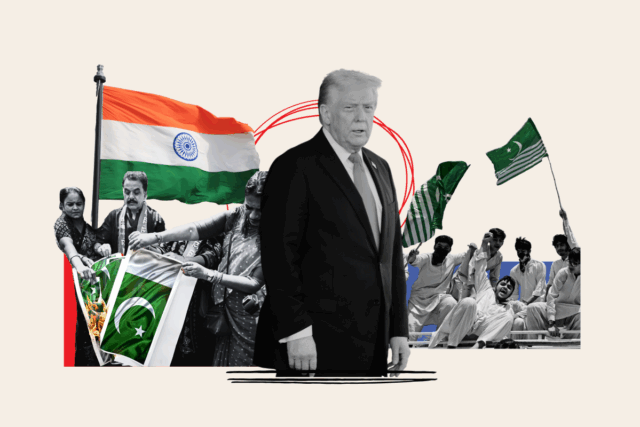As President Donald Trump grapples with wars raging in Ukraine and the Gaza Strip, another major flashpoint is simmering in South Asia, where tensions are escalating after a deadly attack along one of the most militarized boundaries on Earth.
In the bloodiest strike of its kind in years, Islamist militants killed 26 people Wednesday in Pahalgam, a hilly town that lies in the India-administered stretch of the disputed Jammu and Kashmir region. The attack—for which a lesser-known outfit known as the Resistant Front, reportedly tied to the alleged Pakistan-linked Lashkar-e-Taiba insurgent group, has claimed responsibility—took place as U.S. Vice President JD Vance was elsewhere in India for an unofficial visit alongside his wife and children.
Shortly afterward, Vance pledged to Indian Prime Minister Narendra Modi that Washington would “provide all assistance in the joint fight against terrorism,” according to Indian External Affairs Ministry spokesperson Randhir Jaiswal.
While Pakistani officials have vehemently denied any connection to the massacre, a call to arms is gaining traction among the world’s most populous nation across a long-disputed border, setting the stage for the Trump administration to throw its weight behind a diplomatic or military response from India—possibly both.
In any scenario, the stakes are exceptionally high amid a face-off between two nuclear-armed nemeses as reports of clashes emerged Thursday along their contested Line of Control.
Photo-illustration by Newsweek/Getty
‘A Game-Changer’
Kashmir has been at the front lines of the India-Pakistan rivalry since the two nations were partitioned from the formerly United Kingdom-ruled subcontinent in 1947. The vast Himalayan stretch of territory has since been at the center of three major wars fought between the archenemies, accompanied by a three-decade insurgency by separatists on the India-administered section.
The most recent major escalation took place in February 2019, two decades after the last war fought between India and Pakistan. New Delhi responded to an attack claimed by the Jaish-e-Mohammed militant group against Indian forces in Kashmir by conducting strikes across the Line of Control, resulting in a retaliatory attack by Islamabad that downed an Indian warplane.
Modi moved that same year to revoke Jammu and Kashmir’s special autonomous status, drawing outrage from Pakistan and resulting in a deterioration of relations between the two powers. Cross-border clashes erupted the following year, leading to a 2021 truce that has largely been upheld but now risks being unraveled due to the militant attack this week.
Michael Kugelman, director of the Woodrow Wilson International Center for Scholars’ South Asia Institute, described the attack in Pahalgam as a “game-changer.”
“It shatters the relative calm prevailing in Kashmir in recent years, and in so doing it punctures the Indian narrative that normalcy—including stability—has been restored in a highly restive region,” Kugelman told Newsweek. “It’s also the deadliest attack on civilians in India since the 2008 Mumbai attacks, which Indians regard as their 9/11.”
“Given the scale and targeting of this attack,” he added, “it’s all but assured that India will respond with muscle.”
New Delhi has already taken several steps to reduce cooperation with Islamabad. These include the suspension of a water treaty along the shared Indus River, the expulsion of Pakistani military attaches, the withdrawal of India’s defense envoys in Pakistan, the closure of the Wagah-Attari border crossing and an ordering of all Pakistanis on valid visas to exit India within days.
However, Kugelman said such measures “could be the prelude to something bigger.” He argued that “an Indian military retaliation, at some point in the coming days, is a real possibility.”
Such a confrontation presents a conundrum for Trump, who vowed during his successful campaign for a second nonconsecutive term to oversee a more peaceful world.
In the wake of the 2019 clash that took place during his first administration, Trump offered to mediate between India and Pakistan. Six years later, with the U.S. once again signaling “that Washington wouldn’t try to stand in the way if India decides to stage a kinetic response against Pakistan,” Kugelman said Trump may find an opportunity here to turn chaos into calm as he struggles to placate conflicts in Europe and the Middle East.
“We know that Trump relishes negotiation opportunities, which suggests his administration may be prepared to take on that role, despite everything else on its plate abroad,” Kugelman said. “These would be delicate negotiations, given the high stakes and risk of serious escalation between two nuclear-armed rivals, but it’s likely the administration would want to take on that third-party mediator role, perhaps in collaboration with a few of the Arab Gulf players.”
Newsweek has reached out to the Indian External Affairs Ministry, the Pakistani Foreign Ministry and the U.S. State Department for comment.
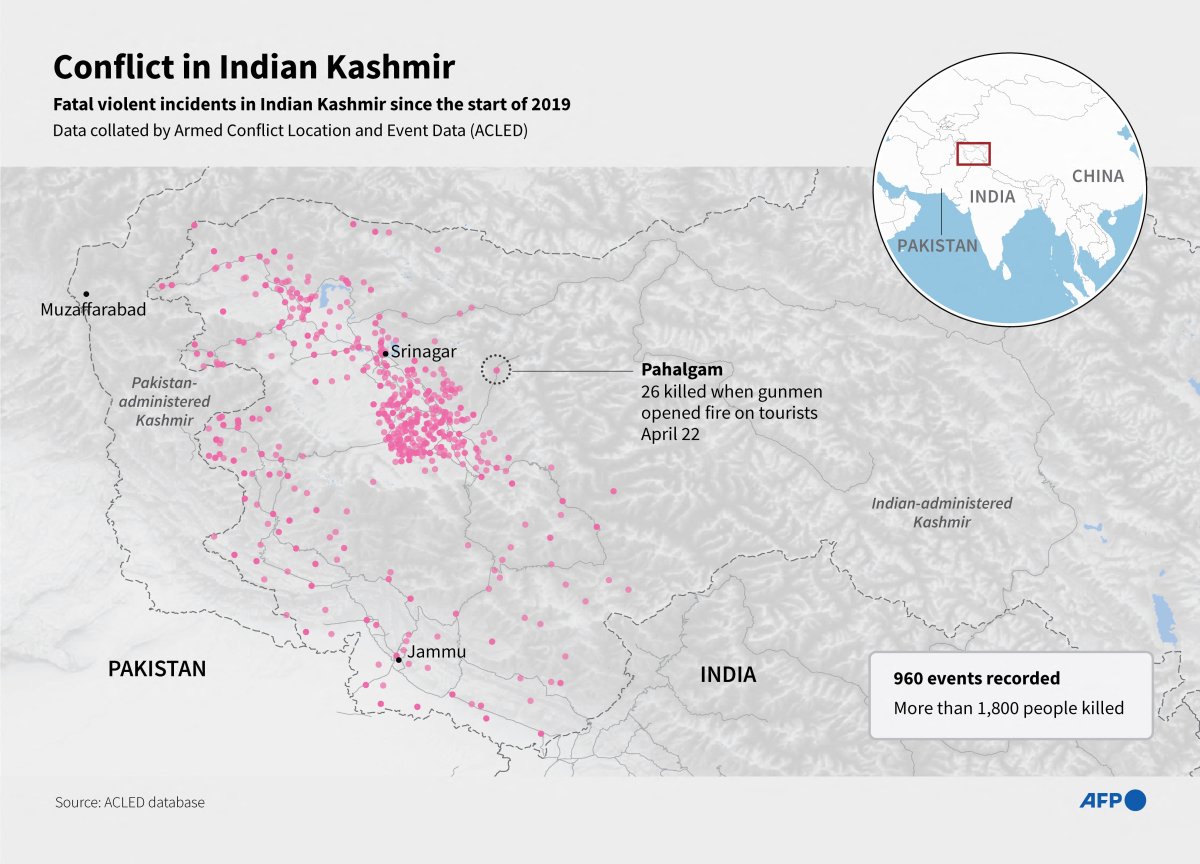
John Saeki/AFP/Getty Images
India’s Retaliatory Options
Arun Prakash, a retired admiral and former chief of staff of the Indian Navy, also saw a potential windfall for Trump if he chose to wade into the treacherous tides of the India-Pakistan feud.
“Since Trump does not seem to be making much headway in Ukraine or Gaza—or the tariff war—de-fusing this serious South Asian crisis would garner some brownie points for him,” Prakash told Newsweek. “Imposing punitive economic sanctions on Pakistan—even temporary—and having them sack the army chief would send a salutary message to hot-head and war-monger folks in both countries.”
Days before the attack in Pahalgam, Pakistani Chief of the Army Staff General Asim Munir delivered a fiery speech in which he described Kashmir as the “jugular vein” of Pakistan.
The comments echo Islamabad’s long-standing grievances with the status quo of India-administered Kashmir, where Modi’s decision to reorganize the territory into a federally led union state was accompanied by mass crackdowns and the deployment of tens of thousands of troops. Pakistani officials allege mass human rights abuses in the region, while Indian officials cite necessary steps to improve the livelihoods of a state long beleaguered by insurgency.
Nevertheless, tough measures are demanded in response to the Pahalgam attack. Prakash, considered one of India’s most decorated military officers outlined three possible courses of action.
These include “punitive action via military/kinetic means with risk of escalation,” “economic blockade of Pakistani ports by the Indian Navy, with risk of international repercussions” and the “invocation of severe economic sanctions via USA and FATF,” the intergovernmental anti-financial crimes body officially known as the Financial Action Task Force.
“All of these should be accompanied by immense diplomatic pressure, and drawing parallels with Hamas 7th of October 2023 attack,” he added.
Pakistani officials have long drawn historical parallels between their feud with India and the Israeli-Palestinian conflict, both disputes having been born out of bloody partitions as the United Kingdom’s colonial empire collapsed in the years following World War II.
In fact, Indian military sources told Newsweek after the Palestinian Hamas movement’s surprise attack on Israel half a year ago that they had shored up defenses along the Line of Control to prevent a similar shock operation being conducted by militants.
Indian troops may be on an even higher level of preparedness today, but Prakash warned that even if hard-liners in India sought to strike back, “the government must remain conscious of the fact that the Pakistani military will be in a state of alert, and kinetic action will be the first step on an ‘escalatory ladder’ whose outcome is unpredictable.”
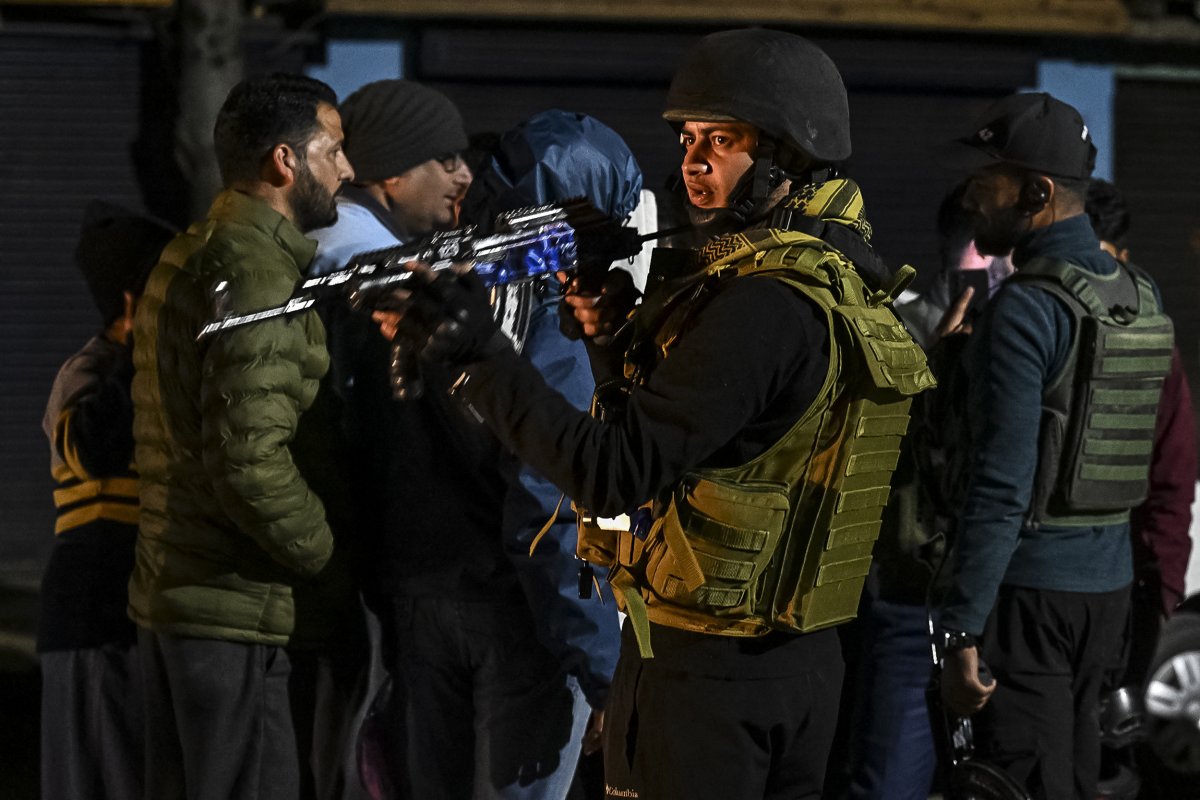
TAUSEEF MUSTAFA/AFP/Getty Images
Pakistan Prepares for Action
Unlike the wars in Ukraine and Gaza, where only one side—Russia and Israel, respectively—possesses nuclear weapons, or even Trump’s diplomacy regarding Iran’s nuclear program, both India and Pakistan each possess hundreds of such weapons of mass destruction.
But the 2019 clash, and an earlier 2016 raid by Indian commandos across the Line of Control after a militant attack on one of their Jammu and Kashmir outposts, demonstrated that retaliatory strikes need not escalate to nuclear exchange. Iran also tested Pakistan’s strategic patience last year by conducting a missile strike against alleged separatist positions across their border, albeit later suffering retaliatory raids against alleged rebel bases in Iranian territory.
In confrontations with both India and Iran, Pakistan has consistently denied offering safe haven to transnational rebels at a time when the country was struggling with deadly attacks by insurgents.
Talat Masood, a retired Pakistani Army general and former federal secretary, argued that the raid in Pahalgam “couldn’t possibly be a part of. government policy or that of military leadership, for they are fully aware that it would have invited an immediate response from India and could lead to wider conflagration, which certainly is not in Pakistan’s interest.”
“Moreover, it would lower Pakistan’s standing and support even from its allies,” Masood told Newsweek, “as we have witnessed China and several Muslim countries have condemned the attack and expressed their support for India in its fight against terrorism.”
“However, what should be of concern, there are some rogue elements within the system that are acting against the interest of the country and creating an embarrassing and difficult situation,” Masood said. “This has given India [reason] to further malign Pakistan diplomatically.”
Now, he said, “the government and especially the military has an enormous task of dealing with the crisis.”
With Pakistan closing its airspace and expelling Indian advisers and diplomats in response to the threats, the government has warned against any attempts to strike Pakistani soil following a National Security Committee meeting chaired Thursday by Prime Minister Shahbaz Sharif.
“Any threat to Pakistan’s sovereignty and to the security of its people will be met with firm reciprocal measures in all domains,” according to a press release issued Thursday by Sharif’s office and shared with Newsweek.
The statement went on to double down on Pakistan’s long-held support for the self-determination of Kashmir, accuse India of carrying out “state sponsored extraterritorial assassinations or attempts on foreign soil” and condemn New Delhi’s barrage of diplomatic measures against Islamabad. The premier’s office took particular aim at Modi’s decision to revoke the Indus Water treaty.
“Any attempt to stop or divert the flow of water belonging to Pakistan as per the Indus Waters Treaty, and the usurpation of the rights of lower riparian will be considered as an Act of War and responded with full force across the complete spectrum of National Power,” the press release said.
Hasan Askari Rizvi, a Pakistani political scientist and military analyst who previously served as caretake chief minister of the Punjab Province, also affirmed that Pakistan would answer in kind to any attacks, while noting that the escalation was currently being managed.
While he described India’s response thus far as “calculated and restrained,” he maintained that “the Pakistan Air Force is on alert to cope with any limited Indian air strike on the line of control in Kashmir or inside Pakistan ostensibly to destroy terrorist camps.”
“Pakistan is expected to give a matching response to any ground or air strike by India, although no one expects a full-fledged war between the two countries,” Rizvi told Newsweek. “Pakistan is already in touch with friendly countries, including the five permanent members of the U.N.”
A number of major powers have a potential stake in the South Asia crisis. China, which lays its own claims to parts of Kashmir, has invested heavily in a growing strategic partnership with Pakistan, while Russia has continued to build upon its long-standing ties to India. Through their own tight relations, Beijing and Moscow have frequently sought to ease tensions between Islamabad and New Delhi, both of which are fellow members of the Shanghai Cooperation Organization.
Rizvi similarly felt that the U.S. would more likely strive to calm tensions rather than green-light any military operations—describing the Trump administration’s language in support of India as closely mirroring remarks delivered in the wake of attacks conducted by militants against Pakistan—which has struggled to stem the activities of a number of insurgent groups, some of which it claims receives backing from New Delhi.
“I do not expect that the U.S. would support any military action by India against Pakistan,” Askari said. “Traditionally, American policy has been to advise both countries to avoid military action because of fear of escalation, given the fact that both India and Pakistan possess nuclear weapons with delivery systems.”
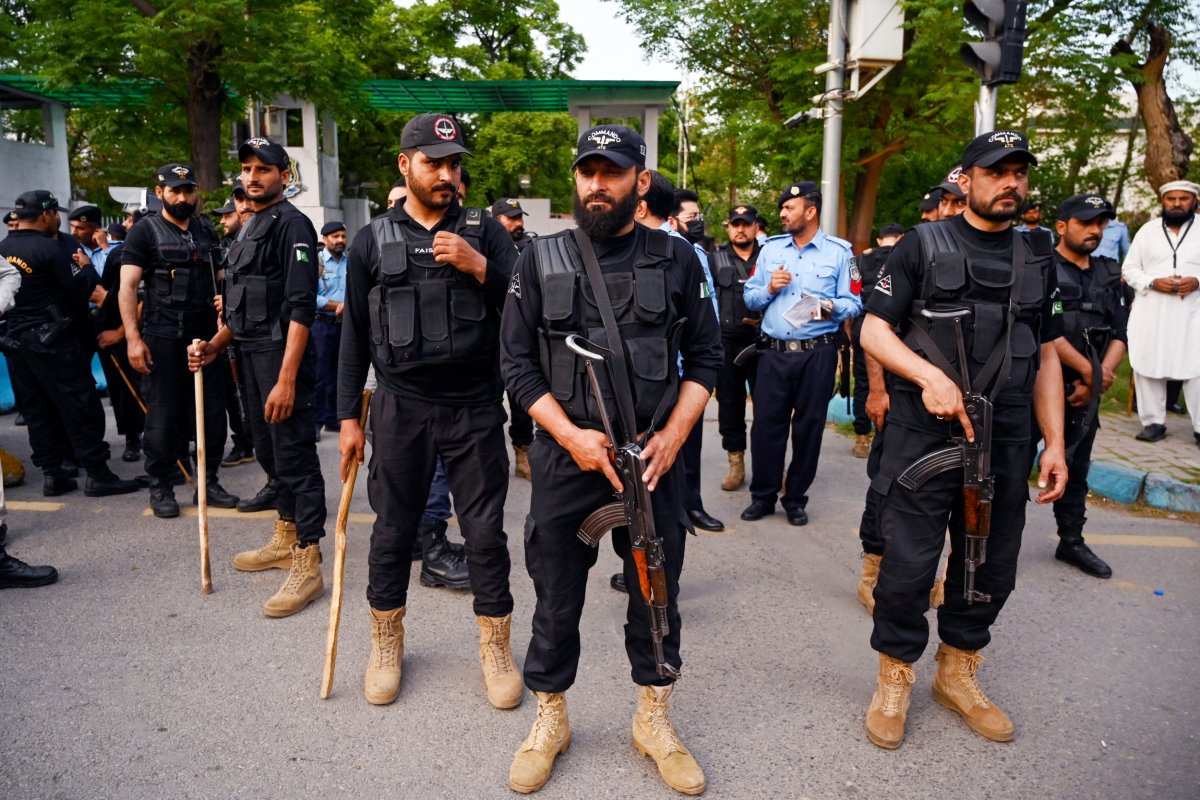
AAMIR QURESHI/AFP/Getty Images
Measured Responses
Noting India’s prior choices of action, Deependra Singh Hooda, a retired lieutenant general who served as general officer commanding-in-chief of the Indian Army’s Northern Command tasked with defending the Line of Control, “would not rule out further action” following India’s latest diplomatic steps against Pakistan.
At the same time, he felt that “while the military option is not ruled out, it is likely to be limited in scope,” as would be the potential role of the Trump administration if attempted to become involved.
“What India wants is for Pakistan to stop supporting terror groups targeting India,” Hooda told Newsweek. “There is little evidence to suggest that President Trump can mediate to mount such pressure on Pakistan that they renounce support to terror groups operating in Jammu and Kashmir. Perhaps the only mediation role is in controlling escalation, if matters reach that stage.”
Yogesh Gupta, a veteran Indian diplomat and former ambassador, was also skeptical of the utility of U.S. intervention in the affair.
“The Trump administration has been very forthcoming in supporting India and condemning these attacks for which India is thankful,” Gupta told Newsweek. “I don’t see any need for any US or foreign involvement in any mediation on the Kashmir issue. If we need any help from the USA or any other friendly state to pursue these terrorists, we will approach them as necessary, but that is speculative at present.”
Gupta also drew a connection to Hamas, citing reports that the Islamist Palestinian faction at the heart of conflict raging across the Middle East, was “involved in this terrorist attack.” Regardless of their local or foreign affiliation, he argued that India would “vigorously chase” the perpetrators while boosting security measures and taking additional steps to “uproot the local supporters and sympathizers of Pakistan-led terror groups and pro-Pakistan elements in the valley and other parts of Kashmir including their financial networks.”
But he expressed confidence that India would respect the precarious equation that has thus far throughout this century kept the decades-long rivalry over Kashmir from escalating into a broader confrontation.
“These are local incidents,” Gupta said, “and India will not do anything to threaten the regional or global security, though it will be firm and unrelenting in pursuit and punishment of the terrorists involved in these and other attacks.”
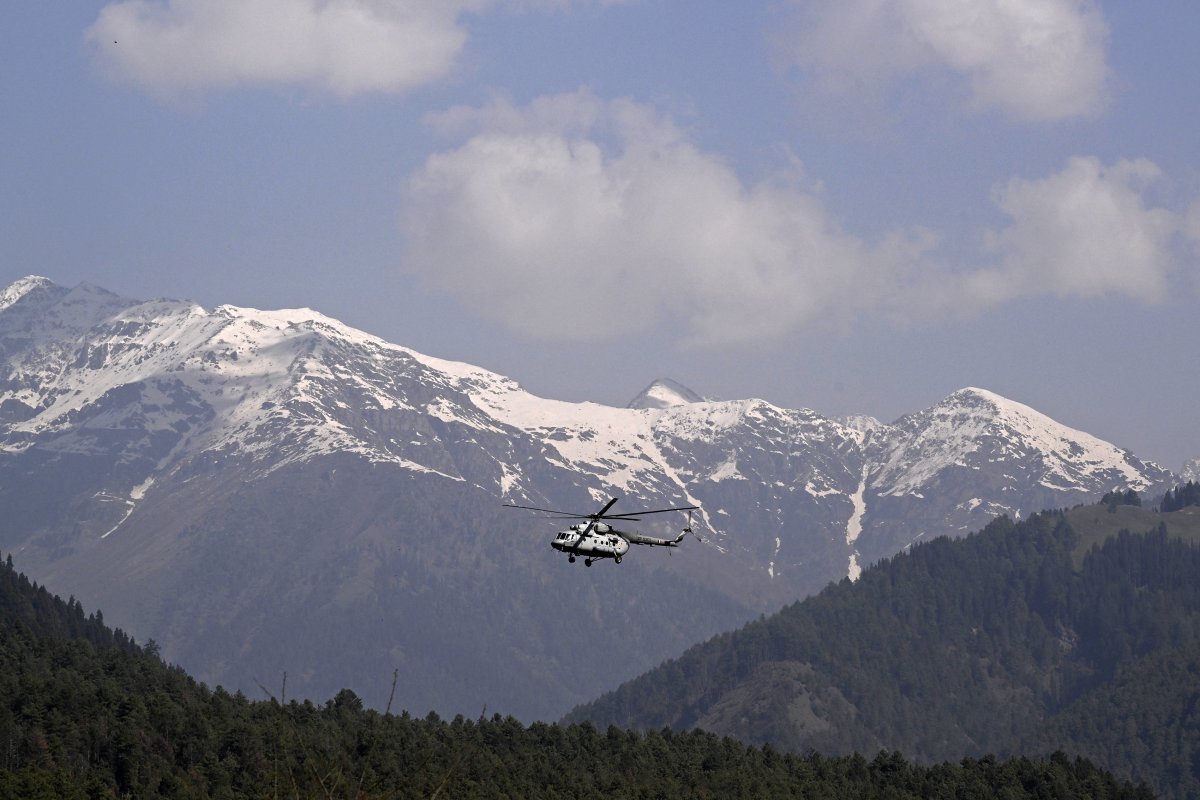
TAUSEEF MUSTAFA/AFP/Getty Images
‘The Last Thing the World Needs’
Most analysts on both sides of the conflict agree that an all-out conflict would prove disastrous for the region, and potentially beyond. At the same time, some analysts felt mediation may only come after further escalation, as was the case when Trump offered to try his hand as resolving India-Pakistan tensions in the wake of their 2019 clash.
“The previous iteration of the mediation offer from the U.S. only came when India conducted the Balakot strikes in 2019 where Indian fighter jets flew across into Pakistan to target terror camps,” Kabir Taneja, deputy director and fellow at India’s Observer Research Foundation, told Newsweek. “If India opts for a similar response again, we could see the U.S. rushing to intervene once again.”
And while he described Pakistan as being “politically isolated,” a position exacerbated by political unrest, economic woes and worsening insurgencies, he argued that “its reality of being a nuclear armed state forces the international community to give it disproportionate attention.”
“The last thing the world needs right now is an India-Pakistan flare up,” he said, “but India, in its current position, may just be forced to respond.”
For now, the Trump administration appears to be carefully curating its response. Asked for the U.S. position on India indicating blame for Pakistan for the Pahalgam attack, State Department spokesperson Tammy Bruce declined to speak beyond support for condemnation of the bloodshed.
“What I can tell you is, of course, as we all know, it’s a rapidly changing situation and we are monitoring it closely, as you might imagine,” Bruce said. “And we, of course, are not now taking a position on the status of Kashmir or of Jammu either, so that’s really going to be the extent of what I can say today.”


